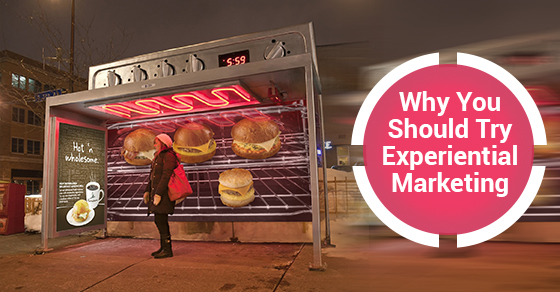25
Dec 2015

Loosely described as messaging you can view, feel, or touch in a physical space, experiential marketing has been on the rise in recent years. According to a study by Event Track – an Event Marketing Institute – large companies have been dedicating a larger percentage of their marketing budgets to experiential marketing year after year: 3.8 % in 2012; 4.7% in 2013; and 9.8% in 2014.
Marketers in every industry, from cinema to automobile seek to create an experience and thus an emotional connection to consumers lives either digitally (via Instagram, Twitter, or YouTube videos) or in-person through events.
Experiential marketing aims at enabling personal connections between brands and their audience by creating real-life experiences worth sharing. It combines real-world and digital connections to establish stronger emotional bonds between brands and consumers. These are not PR stunts, but strategies that put the user at the center of a brand and create an experience worth sharing on their own social networks.
So, why are large companies increasingly investing in experiential marketing?
- It is a proven marketing method
- It is based on engagement
- It is fun
- It appeals to millennials
- It capitalises on modern marketing technology
Although the term “experiential marketing” may be new, the concept has been in existence for a long time. Brands such as Heineken, Coca-Cola, and Red Bull have been real-time event boosters for years. Many companies have also engaged in things like tours and giveaways to promote their products, while convenience stores have organised Free Slurpee Days to boost sales. It is a tried and true method that has predated even television!
Many great brands are beginning to champion a purpose instead of simply marketing themselves. They are opting to do something good for the core consumer without asking for anything in return. The positive perceptions automatically translate to increased sales. For instance, Red Bull goes the extra mile to not only sponsor events, but also organise them, while Converse creates both television ads and recording studios.
There’s no better way to influence people’s behaviour than by showing them a good time. Experiential campaigns are designed to put a smile on the faces of your consumers. A 2012 survey from Jack Morton – a global brand experience – found that 79 percent of American consumers only advocate brands that they have had a great personal experience with.
The current purchasing power of millennials is around $1 billion, and will keep increasing as they continue to advance in their careers. This bracket is skeptical about traditional advertising methods that simply expose them to brands or products, and respond better to engagements that allow them to “feel” the brand.
The best thing about experiential marketing is that clients who are happy with the experience you have provided can share it on social media sites like Instagram, Pinterest, and Facebook, getting the good news about your brand to go viral.
Experiential marketing is still a growing area full of possibility, and more companies will be looking to engage their audience at a much deeper, personal, and emotional level to create a positive buzz that can be shared on social media. For more information on how you can capitalize on this concept, contact our team today!
Recent Posts
Categories
- General Category
- Advertising
- Outdoor Advertising
- billboards
- flash mob
- Guerilla Marketing
- Street Advertising
- Seasonal Advertising
- Ad Campaign
- wild posting
- creative ads
- Chalk Illusion
- marketing
- Experiential Marketing
- Branding
- Marketing Budget
- Guerrilla Advertising
- Offline Marketing
- Print Ads
- Offline Promotions
- Chalk Art
- Advertising Campaign
- Marketing Campaign
- Taglines
- Projections
- Design
- Murals
- Mobile Vehicle Advertising
Archives
- November 2019
- October 2019
- September 2019
- August 2019
- July 2019
- May 2019
- March 2019
- February 2019
- January 2019
- November 2018
- October 2018
- September 2018
- August 2018
- July 2018
- June 2018
- May 2018
- February 2018
- January 2018
- August 2017
- March 2017
- January 2017
- December 2016
- November 2016
- October 2016
- September 2016
- August 2016
- July 2016
- June 2016
- May 2016
- April 2016
- March 2016
- February 2016
- January 2016
- December 2015
- November 2015
- October 2015
- September 2015
- August 2015
- June 2015
- December 2014
- November 2014
- October 2014
- August 2014
- July 2014
- June 2014
- April 2014
- January 2014
- December 2013
- February 2013
- December 2012
- October 2012
- September 2011
- June 2011
- March 2011
- February 2011
- November 2010
- July 2009
- June 2009
- May 2009
 Creative Guerrilla Street Marketing Services
Creative Guerrilla Street Marketing Services